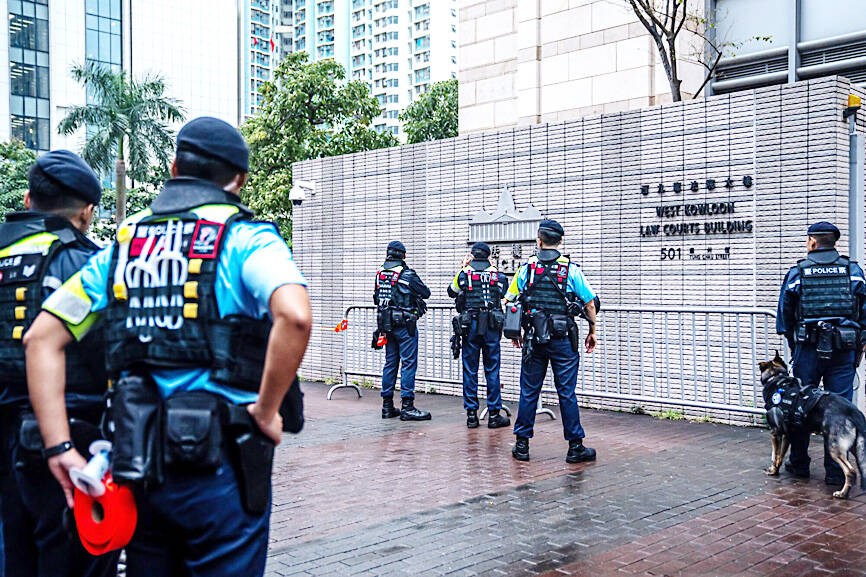There is a human rights crisis in Hong Kong due to the Beijing-imposed National Security Law passed in 2020, the Mainland Affairs Council said yesterday, as it discussed a report showing that the number of prisoners in the territory has risen by one-third since protests in 2019 against an extradition bill.
The Hong Kong Centre for Human Rights on Nov. 7 released a report on torture and inhumane treatment in Hong Kong, which was shared by the council on social media.
Under Hong Kong’s National Security Law, the territory’s pro-democracy parties have been purged, civil society and freedom of speech have been severely oppressed, and the number of prisoners has increased to 9,280, a record high over the past 10 years, the report said.

Photo: Bloomberg
The report highlighted police abuse, pretrial detention, mistreatment in prisons and other instances of torture and inhumane treatment.
The lack of an independent system to report such mistreatments has led to a systematic human rights crisis in Hong Kong, it said.
Since the 2019 protests, the number of incarcerated people in Hong Kong has increased by more than one-third, rising from 6,902 in 2020 to 9,280 this year, it said.
Pretrial detainees have more than doubled in the past 11 years, increasing from 1,561 in 2014 to 3,514 this year and now accounting for 38 percent of all prisoners in the territory, it said.
As of September, 69 percent of people arrested under the National Security Law have been denied bail and 34 of them have been imprisoned for more than 1,000 days, the report said.
The international community must take seriously China’s and Hong Kong’s use of state power and unofficial means to fight, intimidate and suppress human rights defenders, it added.

Taiwan is stepping up plans to create self-sufficient supply chains for combat drones and increase foreign orders from the US to counter China’s numerical superiority, a defense official said on Saturday. Commenting on condition of anonymity, the official said the nation’s armed forces are in agreement with US Admiral Samuel Paparo’s assessment that Taiwan’s military must be prepared to turn the nation’s waters into a “hellscape” for the Chinese People’s Liberation Army (PLA). Paparo, the commander of the US Indo-Pacific Command, reiterated the concept during a Congressional hearing in Washington on Wednesday. He first coined the term in a security conference last

A magnitude 4.3 earthquake struck eastern Taiwan's Hualien County at 8:31am today, according to the Central Weather Administration (CWA). The epicenter of the temblor was located in Hualien County, about 70.3 kilometers south southwest of Hualien County Hall, at a depth of 23.2km, according to the administration. There were no immediate reports of damage resulting from the quake. The earthquake's intensity, which gauges the actual effect of a temblor, was highest in Taitung County, where it measured 3 on Taiwan's 7-tier intensity scale. The quake also measured an intensity of 2 in Hualien and Nantou counties, the CWA said.

The Overseas Community Affairs Council (OCAC) yesterday announced a fundraising campaign to support survivors of the magnitude 7.7 earthquake that struck Myanmar on March 28, with two prayer events scheduled in Taipei and Taichung later this week. “While initial rescue operations have concluded [in Myanmar], many survivors are now facing increasingly difficult living conditions,” OCAC Minister Hsu Chia-ching (徐佳青) told a news conference in Taipei. The fundraising campaign, which runs through May 31, is focused on supporting the reconstruction of damaged overseas compatriot schools, assisting students from Myanmar in Taiwan, and providing essential items, such as drinking water, food and medical supplies,

New Party Deputy Secretary-General You Chih-pin (游智彬) this morning went to the National Immigration Agency (NIA) to “turn himself in” after being notified that he had failed to provide proof of having renounced his Chinese household registration. He was one of more than 10,000 naturalized Taiwanese citizens from China who were informed by the NIA that their Taiwanese citizenship might be revoked if they fail to provide the proof in three months, people familiar with the matter said. You said he has proof that he had renounced his Chinese household registration and demanded the NIA provide proof that he still had Chinese